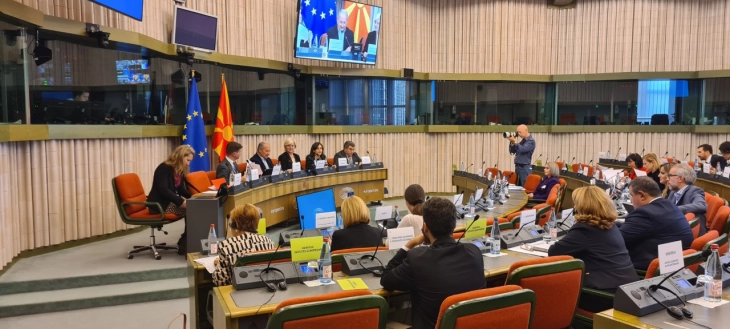EU-N. Macedonia JPC: Country must remain committed to reform implementation

Strasbourg, 6 October 2022 (MIA) - The EU-North Macedonia Joint Parliamentary Committee (JPC) will hold its 20th meeting for a second day Thursday in Strasbourg, the first one since North Macedonia has launched negotiations with the EU. Officials of European institutions, MEPs and Macedonian lawmakers have insisted that a new phase in the relations between the EU and North Macedonia has begun calling on the country to remain committed to reforms and a consensus to be reached over the Euro-Atlantic processes, MIA's Strasbourg correspondent reports.
Macedonian lawmakers and MEPs at the second session of the 20th EU-North Macedonia Joint Parliamentary Committee will debate the environment and energy, good neighborly relations and regional cooperation, a report on the Jean Monnet Dialogue before recommendations are adopted. On Wednesday, views were shared on the rule of law, fight against corruption and organized crime, and the civil society and the media.
In an opening address MEP Andreas Schieder said the EU's credibility has been reaffirmed with the bloc opening negotiations with North Macedonia and Albania and the country's EU integration bid and commitment was rightfully materialized, noting that party dialogue and inter-party consensus is vital at the moment, which could be improved as part of the activities of the Jean Monnet Dialogue.
Michela Matuella, Acting Director for the Western Balkans at the European Commission’s DG NEAR, speaking before lawmakers from the two parliament said that North Macedonia and the EU with the opening of the accession negotiations have entered a new phase whereas the screening process is not only a technical one, but also a transformative one.
MEP Ilhan Kyuchyuk, European Parliament's rapporteur for North Macedonia, said the negotiations process is in safe hands and North Macedonia deserved all the praise for the commitment to the EU integration process, regional cooperation and good neighborly relations.
Deputy PM for European Affairs Bojan Marichikj said in his remarks that the Parliament will be the key partner in the EU accession process, determining the pace of the negotiations, especially considering the role and activities of its working bodies – the European Affairs Committee and the National Euro-Integration Council, the Secretariat for European Affairs said in a press release.
“North Macedonia waited for the start of the Union accession talks for 17 years. It now needs a national consensus and we will define mechanisms so that all lawmakers are engaged in the process. We should seize this historic moment of fulfilling our strategic goal – North Macedonia becoming a member of the EU,” Marichikj told the JPC.
He presented the new negotiating structure that is set to respond to the new methodology but also ensure transparency and inclusiveness of the process, which requires the engagement and cooperation of various stakeholders, such as civil society, academic and business communities etc.
The Deputy PM reaffirmed the Government’s commitment in securing an unhindered process of negotiations, in parallel with the maintenance of goodneighborly relations and realization of undertaken commitments. In addition, he referred to the Government’s activities and progress in certain chapters, as well as planned activities within the explanatory screening.
MP Sonja Mirakovska, co-chair of the meeting, expressed satisfaction from the fact that North Macedonia’s status has finally changed into a country that has launched the EU accession negotiations.
“As a result of the statehood decisions and steps undertaken by Macedonian institutions in recent months, the EU Council decided to adopt the Negotiating Framework on July 18, followed by the Intergovernmental Conferences with North Macedonia and Albania on the next day,” said Mirakovska.
She added that adoption of the negotiating framework traced the path for the start of the accession talks, which represents the final stage of the decades-long process.
“Many politicians, experts and citizens worked for this, many sacrifices, compromises and concessions have been made, lots of energy and efforts have been invested without thinking about our political careers and the consequences of these decisions. Nevertheless, one vision that unified us on this journey is the vision for a better life of our citizens and the second strategic objective that our citizens opted for since the country’s independence – full-fledged EU membership,” said Mirakovska.
Considering the reactions in the public over the content of the negotiating framework, the JPC co-chair said the Parliament has adopted conclusions that obligate the incumbent and future authorities to respect “our red lines over the course of the negotiations’ process.”
“This includes the Government abiding by the commitment for unconditional observance of the linguistic, identity, historic and cultural peculiarities of the Macedonian people as elements that are non-negotiable with the EU, as well as conducting the negotiations on an equal and principled basis while respecting the principles of international law. In addition, issues related to bilateral agreements that are not directly linked to the EU law and the Copenhagen criteria will not serve as benchmarks that determine the opening and closing of chapters and clusters during the accession negotiations,” said Mirakovska.
According to her, the accession talks are not a simple technical operation but a complex set of reforms, adaptation of the institutional infrastructure and enhanced activity of informing the public over the benefits of the reforms’ implementation.
The MEPs and the Macedonian lawmakers at the end of the meeting are expected to adopt joint recommendations, put forward by the JPC's co-chairs, Mirakovska and Schieder.
JPC aims at looking into all aspects of the relations between North Macedonia and the EU, especially the implementation of the Stabilization and Association Agreement. Formally, JPC contributes to improving the relations and cooperation of Parliament with the European Parliament.







